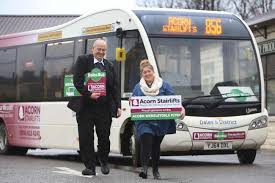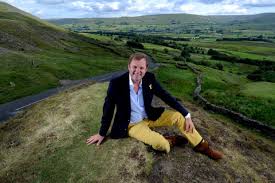Saving the Wensleydale Flyer
When leading UK manufacturer, Acorn Stairlifts, stepped in to save the iconic Wensleydale Flyer, they asked Good Call Media to help them tell the story of the campaign to save the iconic bus service.
See our video report on the story by clicking here.
The ‘Flyer’ operates on a route between Northallerton and Gayle in the world famous Yorkshire Dales National Park and is a lifeline for many local people including elderly residents who rely on the service to move around the Dales.
When cutbacks in funding meant it faced termination, Acorn Stairlifts of Steeton near Bradford, agreed to top up a crowd funded campaign and allow the bus to carry on running for over a year. The company wanted to use our experience as TV journalists to explain the story.
Simon Webster of Acorn Stairlifts, which has been a winner of the Made in the UK business awards and was voted Yorkshire Post Exporter of the Year in 2016, said: “The problem was that the bus faced closing down and many people relied on the service. Our company ethos is to help people to get from A to B on a daily basis, whether it is up and down the stairs or using a rural bus route, the parallels were there and that’s why we stepped in.”
The importance of rural bus services in national parks was also highlighted by Sir Gary Verity, the Chief Executive of Welcome to Yorkshire and the man credited with masterminding the successful campaign to bring the Tour de France to Yorkshire in 2014 – a move that helped to make the Yorkshire Dales internationally famous.
“Rural economies and particularly upland rural economies like the Yorkshire Dales are pretty fragile economically,” said Sir Gary, who owns a remote sheep farm in Coverdale, close to the route of the Wensleydale Flyer, which has now been renamed the Acorn Wensleydale Flyer after Acorn’s intervention.
“Buses are often the threads that hold those national park economies together and allow people who don’t have access to a car to move around the parks,” he added.
Some campaigners have labelled the threat to rural transport as the ‘Beeching of the Buses’, claiming the threat is as potentially devastating as the plan developed by Dr. Richard Beeching that saw the UK’s railway network decimated in the 1960s.
Buses are overseen by the Department for Transport in England and the Welsh Assembly in Wales but decisions on funding for services are made by local authorities.






